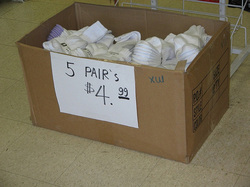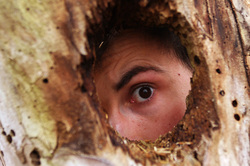 What's wrong with the sign on this box? What's the plural form of "box"? Hints: Look at "pair's," and the plural of "box" is not "boxs." What's wrong with the sign on this box? What's the plural form of "box"? Hints: Look at "pair's," and the plural of "box" is not "boxs." First of all, let's be VERY clear: THERE ARE NO RULES WITHOUT EXCEPTIONS WHEN IT COMES TO PLURALS IN ENGLISH. Some plural forms of nouns you just have to learn by heart (memorize). HOWEVER: here are some basic rules to help you learn how to form plurals for most nouns. 1.) Most of time, just add s. flowers 2.) Add es if the word ends in o. potatoes 3.) Add es if the word ends in ch, sh, x, z, or s. glasses, churches, boxes, flushes 4.) Add s if the word ends in y with a vowel before it. monkeys, stays 5.) Add ies if the word ends in y with a consonant before it. parties Master these five before you try the next three. These rules are not used very often. 6.) Add s if a proper noun (a name) ends in y. the McKinley family -- the McKinleys 7.) Add s to the main noun in a compound noun, which has more than one word. brothers-in-law 8.) Add s to the end of the end of compound noun with no main noun. follow-ups, trade-ins Source: Painless Grammar by Rebecca Elliott, Ph.D., 1997
0 Comments
 Can you keep a straight face when you look at this guy and his silly hat? Can you keep a straight face when you look at this guy and his silly hat? Here are some more idioms with "keep" to keep you on your toes. (Do you remember that one from the last post? If not, look back and read the definition and examples again.) 1.) Keep (Someone's) Cool This means to stay calm; don't get angry when you are in a situation that is frustrating. For example, you might say to a parent who is about to become very angry with his or her child, "Keep your cool! Don't get too upset." 2.) Keep Track Of (Something) This means to be organized, not to lose something. For example, you might tell your child, "You must keep track of your homework. If you lose it, you will not get a good grade from your teacher." 3.) Keep a Straight Face This means that your face does not express the fact that inside, you want to laugh. You do not smile or laugh. Continuing with the children-themed examples, if your child does something really silly that he or she should not do, you must keep a straight face so that he or she doesn't think you think it's funny.  There are dozens of idioms in English that start with "keep," and there are a few that combine "keep" with some body part. There are even a few that use "keep" and types of clothing! (We'll save that for another post, as well as more "keep" and body part idioms . .) Try using these idioms today when you're talking with your friends or colleagues: 1.) Keep an Eye Out This means to watch closely for something to happen. For example, you might say to a work colleague, "Keep an eye out for the latest shipment. Let me know when it arrives." 2.) Keep (Someone) at Arm's Length This means that you should not get too close to someone. Stay a safe distance away. For example, you might say of a new boyfriend or girlfriend that you want to keep him/her at arm's length until you get to know him/her better. 3.) Keep (Someone) on (My, Your, His, Her, Our, Their) Toes This means that you focus your attention on someone to ensure he/she is doing his/her job. For example, you might say, "My boss is always watching me, trying to keep me on my toes." Watch out for more idioms with "keep" in another post! Maybe you already know about the "first conditional." The first conditional is a structure we use in English to talk about a likely future event.
For example: If I get a good grade on the test, I will have a party. In this example, we use the present simple tense to describe the condition, or the probable future event. We use the future tense with will + base verb to talk about the result. The result is what happens if the condition does happen in the future. So, this example sentence means "I believe that I probably get a good grade on the test. I will have a party if I do." But did you know that you can also sometimes use modals like might, must, can, shall, or may instead of will? If I get a good grade on the test, I might have a party. - (It's possible I will have a party if I get a good grade on the test.) If I get a good grade on the test, I must have a party. - (I have had poor grades in the class this semester so far. I think I can pass this test. I feel like it is necessary that I celebrate if I do!) If I get a good grade on the test, I can have a party.- (My parents gave permission for me to have a party if I get a good grade on the test.) If I get a good grade on the test, I shall have a party.- (like "I will") If I get a good grade on the test, I may have a party.- (It is possible that I will have a party if I get a good grade on the test.) You can also switch the condition and result parts of the sentence. I will have a party if I get a good grade on the test. I might have a party if I get a good grade on the test. I must have a party if I get a good grade on the test. I shall have a party if I get a good grade on the test. I may have a party if I get a good grade on the test. I can have a party if I get a good grade on the test. Uncountable nouns are confusing to many English language students. Uncountable nouns are nouns that you cannot separate into individual parts. You cannot count them. For example, you cannot count milk.
We use "some," "any, "much," and "a little" with uncountable nouns, but we don't usually use "a," "an," or "the" with them. We can say "a little milk," but we cannot say "a milk." Here are some helpful words that go with uncountable nouns if you want to be able to "count" them. For instance, you can say the following: a liter, gallon, carton, bottle of milk a loaf of bread a piece of bread. Have you ever wondered how to properly use an apostrophe when two people are involved? Here's the scoop (scoop=important information):
Other examples: The school and the teacher's goals are the same. The school's and the teacher's goals are not the same. Flynn and Damien's car is red. Flynn's and Damien's cars are red and blue. |
AuthorLeyla Norman Archives
July 2020
Categories
All
|

 RSS Feed
RSS Feed
